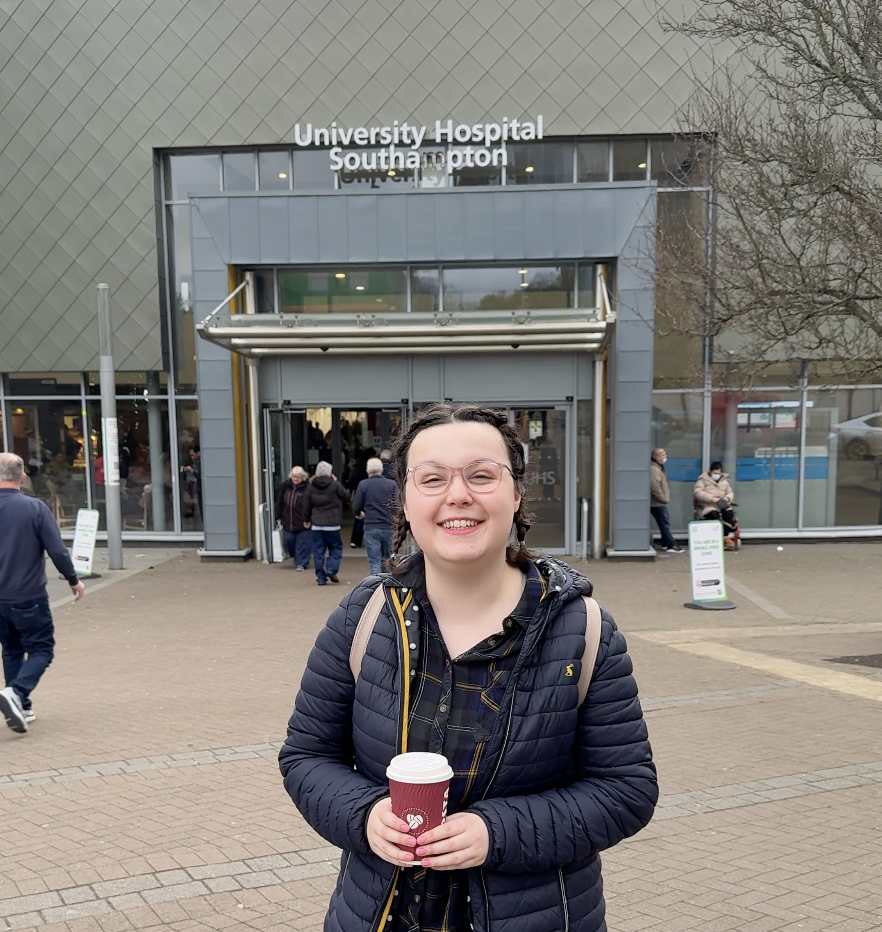What happens when the very hospital meant to care for you leaves you fighting with unbearable side effects instead?
For eight months, I have been battling Southampton General Hospital – not just for treatment, but for basic dignity and coordination of care. This isn’t just about me; it’s about a system that is failing countless disabled patients. And if we don’t advocate for ourselves, no one else will.
Southampton General has been a lifeline for me over this past year with my worsening health and complex surgery. There are countless members of staff that I will forever be grateful to, who have genuinely saved me on multiple occasions. However, fear of speaking out shouldn’t hold me back from sharing my experience lately, and I try to save space for the fact that I can be thankful for the care I have received in the past while being frustrated at the lack of consideration I am getting now.
I want to share my experience not just to document my own struggle but to send an urgent message to others navigating the healthcare system: You MUST advocate for yourself. Doctors, hospitals, and the NHS do not always get it right – and if you don’t fight for your care, you may be left to suffer the consequences without anyone giving it a second thought.
My Situation: The Care I Desperately Need, But Can’t Get
In July 2024, I was diagnosed with Enteropathic Arthritis (a form of inflammatory arthritis linked to IBD) after months of misdiagnosis, being told I had various acute injuries – including a meniscus tear and a fractured elbow. Once I was correctly diagnosed, I was started on Sulfasalazine tablets, alongside Prednisone steroids – something I was no stranger to, as I’d already been on them since the previous September for Ulcerative Colitis which I’d had surgery for in the March.
This treatment was supposed to manage my severe joint pain and inflammation. However, three months in, my rheumatologist informed me that it was completely the wrong course of treatment – because the tablets were designed to be absorbed in the colon, which I no longer have. I was meant to taper off the steroids after three months when the tablets started working, but instead, my prescription was extended.
Treatment Failures & Dangerous Side Effects
After the Sulfasalazine failure, rheumatology moved me to Methotrexate injections – which I had to administer myself at home. Despite being given the medication by the hospital, I received no instruction on how to use it and had to arrange my own training with my GP. I know it’s not rocket science, but I was told not to use it without being shown first. Within two weeks, I started having a reaction, and within three weeks, I was hospitalised because it was too severe to continue living with. During this time, a nurse told me to “consider myself lucky, because the flushing rash I had developed on my face from the reaction looked like makeup.” Not exactly what you want to hear when you’re being told that yet another medication is failing.
During this reaction, I noticed my eyes were starting to cause me some pain and my vision was blurred. Quickly, this became my eyeball looking visibly red, and before long, it was sore and I couldn’t open it. I was seen by eye casualty, following my admission for my larger reaction, where I was diagnosed with Uveitis – an inflammatory condition directly linked to my arthritis. My unmanaged inflammation had now spread to my eyes – without treatment, I’d lose my vision altogether. My ophthalmologist put me on even more steroids, this time as eye drops.
Often the treatment needs to be wider and more systemic in order to tackle all these ‘little’ symptoms that stack up. In my case this meant moving onto biologics.
I was placed on a waiting list for Infliximab in October and told to stay on steroids until my appointment. Months passed with no updates and no movement from the hospital. Finally, on 22nd January 2025, I had my first infusion. I was told it would take at least three infusions to see any results.
Unfortunately, I never got as far as my third infusion. Ten minutes into my second I had an anaphylactic reaction, resulting in a visit from the resuscitation team, a night in the hospital, and the decision that I could no longer take Infliximab. At this point, I’ve been on Steroids for almost 1.5 years. I was discharged, given two Epi-pens and told to await a follow-up appointment.

Where I Stand Now: Stuck & Running Out of Options
I am stuck on high-dose steroids as a stopgap between medications that don’t seem to be working. The steroids are causing severe Cushing’s Syndrome, swelling, bone density loss (osteopenia), and strain on my heart.
If I reduce the steroids, my arthritis will flare so severely that I will lose mobility and potentially lose my vision due to uveitis. The last time I was unmedicated, I was admitted to the hospital because my spine and jaw became so inflamed that I couldn’t move or function independently. I couldn’t eat, I couldn’t speak and I couldn’t care for myself in any way.
Despite explaining my situation to the team in Rheumatology at Southampton General, as well as having the back up of my GP, my next appointment isn’t until April 2nd 2025 – meaning I will be left without a treatment plan for over eight weeks. This is, according to the department the ‘expedited’ option.
Even after the appointment, it could take another 4-6 weeks to start the new treatment – meaning I could be left without a solution until June 2025.
Biologic treatments have a 3-9 month loading period, meaning even once I start, I could be waiting almost a year for symptom relief.
I CANNOT stay on steroids for another three months. Yet that is exactly what I am being forced to do because the hospital will not treat my case with any urgency.
If I hadn’t persistently pushed for help, I wouldn’t have made it this far, but even despite this, I am still not getting anywhere with any speed.
Something that feels “missed” by rheumatology as a department is the fact that I am still young. Unlike their older demographic, I am 24 years old. The long-term effects of these medications will shape the rest of my life – but the urgency to prevent that damage isn’t there.
What’s happening now?
Through the team at PALS, we are trying to coordinate an Multi-disciplinary Team meeting between all of the people involved in my care to get a plan in place – but even PALS are finding this tough to arrange.
It is clear that there is still much confusion between the departments, so this is still something I’m really hoping can be arranged. The departments need to look at me as a whole person rather than as separate issues. With the
- IBD triggering the Inflammatory Enteropathic Arthritis which affects my joints and eyes;
- Hypermobile Ehlers-Danlos Syndrome affecting my joints, venous access and skin quality;
- Ileostomy, allergies, and potential neurological issues limiting the oral medication/supplements etc. that I can take and absorb;
- the prolonged steroid usage impacting my bone health, but reducing the dosage flaring up my inflammation the point of physically not being able to move, eat, or do anything without being in agony (and I mean anything – making a drink, answering the door, going to the bathroom…);
- and my previous Medical Trauma and Autism making generally everything more difficult to cope with
my case certainly requires a coordinated effort from all parties.
Things I’ve learnt About How You Can Take Control of Your Care
- Don’t accept “no” as a final answer – keep pushing for solutions.
- Contact PALS (Patient Advice & Liaison Service) to escalate your concerns.
- Request an MDT meeting if multiple departments aren’t communicating.
- Get your GP to back you up with written letters – they carry weight.
- Request reasonable adjustments (like email communication instead of phone calls if needed).
- Document everything – every appointment, every delay, every refusal of care.
- Use social media and advocacy groups to bring awareness to systemic failures. Unfortunately, it’s only when we all come together to talk about this that anything changes.
This isn’t about complaining – it’s about ensuring our quality of life.
I never wanted to be in this position – pleading for basic medical care while my health declines. But unfortunately, this is the reality for many disabled and chronically ill patients navigating the NHS system.
Southampton General Hospital: I appreciate everything you have done for me, but you need to do better and until you do, I won’t stop fighting. You cannot leave me like this.











I wish I had read an article like this before my last UC flare, I perhaps wouldn’t of ended up with emergency surgery. So important to advocate for yourself and you know your body better than anyone! Great read Mali 💖